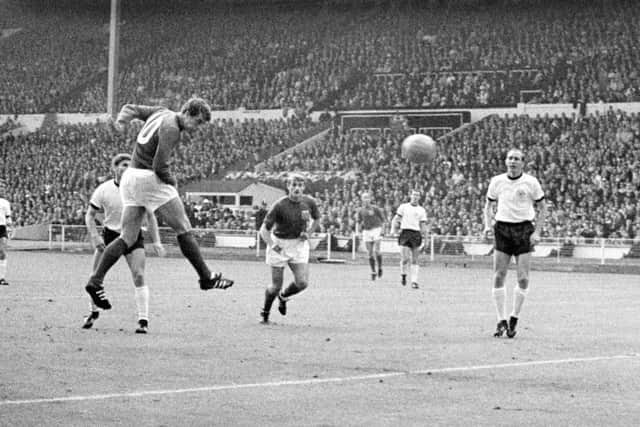Chris Bond: Like the current England football team, Jeremy Corbyn is not a winner


It was a defining moment for the country. Not only was this a sporting triumph to rank among the greatest in the nation’s history, but it symbolised a new beginning as Britain emerged into a bright new, Technicolour world.
If English football was basking in the warm glow of success, then so, too, was Harold Wilson’s Labour Party which four months prior to England’s World Cup heroics had seen its House of Commons slender majority increase dramatically following the 1966 general election.
Advertisement
Hide AdAdvertisement
Hide AdThree decades later and Tony Blair and New Labour were swept to power on a wave of euphoria. As with the ‘Swinging Sixties, there was a swagger and self-confidence about Britain in the mid-90s (though, unlike 1966, football didn’t find its way home).
Blair, like Wilson before him, was quick to embrace this mood of optimism. But while many people today view the Huddersfield-born leader as one of the greatest British Prime Ministers of the past century, you would struggle to elicit similar support for Tony Blair.
He has become arguably the most reviled former PM in modern British history. Tories can still get misty eyed at the mere mention of Margaret Thatcher’s name. But not so Labour supporters with Blair.
This despite the fact that he won three back-to-back elections and is the most successful Labour leader in the party’s history.
Advertisement
Hide AdAdvertisement
Hide AdThere are several reasons behind this, but chief among them is Iraq.
Just as David Cameron will go down in history as the man who lost the EU Referendum, Blair’s legacy has become haunted by his support for the invasion of Iraq in 2003.
Not only was the decision hotly disputed but there were question marks over whether he misled the country and the subsequent, tragic, failure to bring peace to Iraq led to bitter recriminations.
It was the greatest mistake of his premiership and the ramifications have been far-reaching consequences.
Advertisement
Hide AdAdvertisement
Hide AdInstead of being lauded for introducing the minimum wage, investing huge sums of money into education and the NHS, overseeing the longest period of uninterrupted growth in modern British history and playing a key role in the Good Friday peace agreement in Northern Ireland, Blair is remembered for the decision to invade Iraq.
His flawed judgement on this one, albeit important, issue created a toxic legacy that has not only blighted his reputation, but it also opened the door for the re-emergence of Labour’s Left.
It started with the leadership battle in 2010 when David Miliband, backed by many Labour MPs and MEPs, was seen as the heir apparent. Had he won, then the British political landscape may well have looked very different today. But it was his brother Ed, thanks to powerful union support, who won by a whisker.
Five years later – and having been roundly rejected by the electorate once again – the Labour Party lurched further to the Left with Jeremy Corbyn.
Advertisement
Hide AdAdvertisement
Hide AdHis beguiling anti-austerity message struck a chord with those who had grown tired of hearing the same, ineffective message and wanted a change.
The problem with Corbyn, though, is he neither offers something new, nor is he a leader – as his ineffectual performance during the referendum campaign painfully exposed.
The botched coup that saw mass resignations from the Shadow Cabinet was borne out of desperation and the realisation that Labour had become a party of protest once again.
Owen Smith, on the campaign trail in Yorkshire this week, may still defeat him but at this moment in time it looks unlikely. Leading moderate lights, such as Hilary Benn and Dan Jarvis, either don’t want the top job or don’t believe they can oust Corbyn themselves right now.
Advertisement
Hide AdAdvertisement
Hide AdWhat we are left with is the wretched spectacle of a bitter civil war not seen since those dark days in the early ’80s when Tony Benn and Denis Healey grappled over the party’s political soul.
If Labour supporters genuinely want to see change in this country then they need their party to be electable – a prospect unattainable with Corbyn and John McDonnell at the helm.
You can’t improve the NHS, tackle inequality, or boost housing and social mobility unless you are in power. Every general election in this country for the past 50 years has been won by those occupying the middle ground, not the political hinterlands.
Corbyn’s supporters might point to the fact that the Labour Party has more members now than at any point in its modern history. But they won’t decide who wins the next election.
Advertisement
Hide AdAdvertisement
Hide AdYou need to be in power in order to make a difference to people’s lives. Harold Wilson understood that and so did Tony Blair.
Labour militants can rant about Blair and the tragic folly of the war in Iraq until the cows come home. But the truth is they need a unifying figure as Blair was in the early days – someone who can appeal to ordinary voters rather than preaching to the converted.
Until they accept this, Labour has about as much chance of winning the next election as Sam Allardyce does of lifting the World Cup.